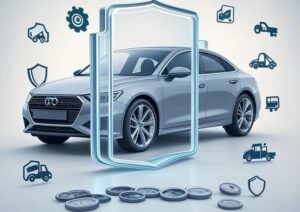Ever felt like you’re overpaying for car insurance? You’re probably right. Many people lose thousands of rupees simply because they buy or renew their policy through a dealer or local agent. For example, a dealer might quote ₹1,05,000 for a new car’s insurance, but you could get the same coverage online for just ₹61,503. That’s a saving of over ₹40,000! 🤯
This guide will break down car insurance into simple terms, so you can confidently buy the best policy online in minutes and keep that extra money in your pocket.
The Car Insurance Core Concepts: First-Party vs. Third-Party
First, let’s understand the two basic types of insurance. Think of it this way: on the road, you are the first party, your car insurance company is the second party, and everyone else is a third party.
- Third-Party car Insurance: This is the most basic and legally mandatory insurance in India. If you cause an accident, this policy covers the damage to the other person’s vehicle or property, as well as any injuries they may sustain. This type of insurance excludes any repairs for your own vehicle. Furthermore, driving without this mandatory cover is illegal and will result in a significant penalty if you’re stopped by the authorities.
- First-Party (Comprehensive) Insurance: This is the one you really want. It includes all the benefits of third-party insurance, plus it covers damage to your own car. Whether it’s an accident, theft, fire, or natural disaster, comprehensive insurance has your back.
Here’s a simple breakdown:
Supercharge your Car Insurance: Must-Have Add-Ons

A comprehensive policy is a great start, but add-ons give you complete peace of mind. Without them, even with a comprehensive policy, you might only get 50% of the claim for plastic, glass, or rubber parts due to depreciation. This is where add-ons save the day!
Here are the most important ones you should always consider:
- Zero Depreciation (‘Zero-Dep’ or ‘Bumper-to-Bumper’): This is the most crucial add-on. It ensures that in case of a claim, the insurance company covers 100% of the cost of new parts without deducting for depreciation. You just pay a small file charge (usually around ₹1,000 – ₹1,500), and the rest is taken care of.
- Engine Protection Cover: A standard ‘Zero-Dep’ policy covers the car’s body, not the engine. If your engine is damaged in an accident or due to water damage, this add-on will cover the substantial repair costs.
- Consumables Cover: When your car is repaired, items like nuts, bolts, engine oil, and grease need to be replaced. These small costs, called consumables, are not covered under a standard policy. This add-on takes care of them, so you have zero out-of-pocket expenses.
- Return to Invoice (RTI): Imagine you bought a car for ₹10 lakhs. Four years later, its value is down to ₹5 lakhs. If it gets stolen or damaged beyond repair, a normal policy will only pay you ₹5 lakhs. With RTI, the insurance company will pay you the original ₹10 lakhs—the full price from the invoice. This is extremely valuable, especially for new or expensive cars.
- Roadside Assistance (RSA): If your car breaks down in the middle of nowhere, this add-on is a lifesaver. The insurance company will arrange for a tow truck or a mechanic to help you out.
The Big Question: What’s Your Car Worth? (IDV Explained)

The Insured Declared Value (IDV) is a critical component of your vehicle’s insurance, as it determines the maximum claim you can receive. This figure represents your car’s worth in the current market, not the price you paid when it was new. As a car ages and depreciates, its IDV is consequently reduced each year.
When you insure a brand-new car, the IDV is calculated as 95% of its ex-showroom price. For renewals, the depreciation is calculated based on the car’s age.
standard table:
For example, for a 4-year-old car that had an ex-showroom price of ₹10 lakhs, the IDV would be around ₹5 – ₹6 lakhs.
Your 5-Minute Guide to Buying Insurance Online
Buying insurance online is incredibly simple and transparent.
- For a Brand New Car: Since you don’t have a registration number yet, you’ll see an option like “Brand New Car.” You’ll need to enter the car’s make, model, and its chassis number and engine number to get the policy.
- For Renewing an Old Car: Simply enter your car’s registration number, and the website will fetch all the details.
The process is straightforward: choose your IDV, select the add-ons you want by ticking the boxes, compare quotes, and pay. The policy document is emailed to you instantly!
By taking just 10 minutes to do it yourself, you can save thousands. As in my friend’s case, he was quoted ₹18,000 by a dealer for his 4-year-old Hyundai Venue. He bought the same policy online himself for just ₹11,238, saving nearly ₹7,000!
Read Also : Pre-Delivery Inspection (PDI) Checklist for New Cars: A Complete Guide to Check Your Car Before Delivery
Your Smart Insurance Checklist ✅
To sum it all up, here’s what you need to do to get the best deal:
- Always Buy/Renew Online: Avoid dealers and agents to save on commissions.
- Choose Comprehensive Cover: Never rely on just third-party insurance.
- Get Essential Add-ons: Zero-Depreciation, Engine Protection, and Consumables are non-negotiable for complete coverage.
- Consider Return to Invoice (RTI): It’s a smart choice, especially if your car is less than 5 years old.
- Set the Right IDV: Use the chart above to declare a fair value for your car.
Armed with this knowledge, you can now make an informed decision and ensure your vehicle is protected without breaking the bank. Happy driving! 🚗💨

Sajid Ahmad is an auto enthusiast and passionate blogger who loves exploring the world of cars, bikes, and emerging automobile technologies. With a deep interest in how vehicles shape everyday life, he shares insightful reviews, tips, and updates from the auto industry. Through his blog, Sajid aims to make it easier for readers to stay informed and choose the right ride for their needs


1 thought on “Unlock Huge Savings on Your Car Insurance: A Simple Guide”